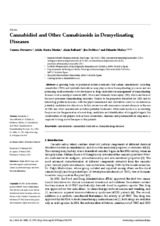Cannabidiol and Other Cannabinoids in Demyelinating Diseases
Autor
Navarrete, Carmen
García-Martín, Adela
Rolland, Alain
DeMesa, Jim
Muñoz, Eduardo
Editor
MDPIFecha
2021Materia
CannabinoidsCannabidiol derivatives
Demyelinating diseases
METS:
Mostrar el registro METSPREMIS:
Mostrar el registro PREMISMetadatos
Mostrar el registro completo del ítemResumen
A growing body of preclinical evidence indicates that certain cannabinoids, including cannabidiol (CBD) and synthetic derivatives, may play a role in the myelinating processes and are promising small molecules to be developed as drug candidates for management of demyelinating diseases such as multiple sclerosis (MS), stroke and traumatic brain injury (TBI), which are three of the most prevalent demyelinating disorders. Thanks to the properties described for CBD and its interesting profile in humans, both the phytocannabinoid and derivatives could be considered as potential candidates for clinical use. In this review we will summarize current advances in the use of CBD and other cannabinoids as future potential treatments. While new research is accelerating the process for the generation of novel drug candidates and identification of druggable targets, the collaboration of key players such as basic researchers, clinicians and pharmaceutical companies is required to bring novel therapies to the patients.

